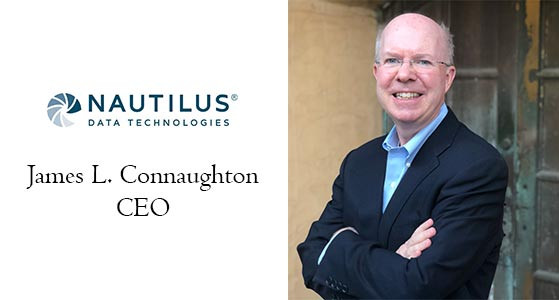30 Most Influential Companies of the year 2020 (Special Edition)
CIO Bulletin

The sole purpose of data center cooling technology is to maintain environmental conditions suitable for information technology equipment (ITE) operation. Achieving this goal requires removing the heat produced by the ITE and transferring that heat to some heat sink. In most data centers, the operators expect the cooling system to operate continuously and reliably.
Nautilus Data Technologies created the world’s most innovative water cooled data center design, setting a new standard for energy efficiency, environmental sustainability and global scalability.
Nautilus’ patented data center technology transforms the decades-old data center cooling paradigm, from using complicated, unsustainable, forced air-cooling systems, to instead using a compact, ultra-efficient, water-cooling system that takes advantage of renewable supplies of naturally cold water. This innovation replaces conventional air-cooling systems that consume 40-80% of data center power with a water-cooling system that consumes less than 15% of data center power. This water-cooling system, trademarked as TRUE™ (Total Resource Usage Effectiveness), can either be incorporated into a building structure on land near a large body of water (sea, bay, river, or lake) or can uniquely be pre-manufactured onto a barge, delivered almost anywhere in the world, and berthed at the shoreline for its operational life cycle. Nautilus’ superior power and cooling efficiencies enable more rapid scaling of the next generation of valuable high-performance/high-density computing systems needed for healthcare, industrial, smart-infrastructure, gaming, machine learning and artificial intelligence systems.
Let’s get in touch with Jim Connaughton, CEO and Rob Pfleging, President to know more about the company.
How did you get the idea of setting up a company related to water cooling technology?
TRUE™ was initially conceived and developed by Nautilus founder Arnold Magcale, a Navy special forces veteran and 20-year veteran of the data center sector. Concerned about how enormously wasteful data center consumption of energy, water, and other resources was becoming, Magcale conducted extensive research in to the most energy efficient ways to build and operate data centers, with a view to naturally cold water being the solution to the growing energy and water consumption problem. Drawing on Magcale’s experience with liquid cooling systems on Navy vessels and on Nautilus’ early advisors and engineering staff’s experience with water cooling in other sectors such as thermal power generation, industrial manufacturing and shipping, the company developed, deployed and tested a prototype modular data center in 2014-2015.
Educate us on your innovative water-cooled data center design and its upsides.
TRUE™ employs the engineering principle of continuous use of naturally cold water through a heat exchanged open to closed loop circulation system. The initial energy capture occurs at the back of the server racks via rear door heat exchange or via separate heat exchangers in a direct to chip or immersion application. Unlike conventional data centers, there are no large air handling systems, no requirement of complex raised floor architecture, no “hot aisle” or “cold aisle” containment infrastructure, no geographic limitations associated with “free air,” no external noise, zero water consumption through evaporation, and an overall simplified operating environment. The TRUE™ system allows Nautilus to employ automated, precision cooling of each rack, leveraging up to six discrete cooling zones based on the load in each row of racks, rather than having to broadly cool an entire data hall or full aisle of server racks. This technology enables Nautilus to sustain a continuous level of ultra-efficiency, 24-7, regardless of season or weather. The Nautilus design enables commercially scalable and affordable infrastructure that can support the introduction of logarithmically more powerful servers that run hotter than current data center designs can effectively support, thus opening the door to a level of efficient and sustainable data center environmental performance that is tens, hundreds, or possibly even thousands of times betterper unit of compute.
How is your innovative cooling technology environment-friendly? How are your customers benefited from this?
In sharp contrast to the increasingly heavy environmental and community burden of the ever larger and highly resource intensive data centers being built today, Nautilus’ data centers deliver major gains in environmental performance and community benefits.
Nautilus significantly reduces energy-related CO2 emissions and air pollution by 30% or more, with no consumption of public drinking water, no use of water treatment chemicals, no use of chemical refrigerants that are potent greenhouse gases and ozone depleting substances, no production of wastewater, no adverse impact on water quality, fish or wildlife, and no noise pollution.
Nautilus data centers are particularly well suited for industrial and port locations, typically in economically disadvantaged areas, where power availability, water access, and proximity to population centers is nonetheless ideal. Such “brownfields” restoration offers an economic development and jobs engine to communities facing deindustrialization. Importantly, Nautilus not only is fulfilling the promise and expectation of technology-driven redevelopment and job creation in economically disadvantaged communities in the developed countries, but also the more rapid, secure, and environmentally sustainable “democratization of data” through access to essential, and sustainable, digital infrastructure by people and communities currently lacking it in emerging economies all around the world.
What is next for Nautilus?
Nautilus Data Technologies achieved a major milestone for the company and for the industry by transporting our first water-cooled data center from the Mare Island Navy Shipyard in Vallejo, California, to its long-term home in Stockton, California. The 6MW data center will provide ultra-efficient, high-performance, and environmentally sustainable co-location services to customers connecting from and to Northern California, North America, and the world. Nautilus has now proven the viability of pre-fabricating and (literally) shipping a commercial scale data center into the heart of an urban brownfield location. We look forward to commissioning the Stockton data center and onboarding our first customers before the end of 2020.
How does Nautilus fit into the global picture?
Applied Materials (NYSE: AMAT), the global leader in materials engineering solutions for the semiconductor, flat panel display and solar photovoltaic (PV) industries, estimates that artificial intelligence compute alone will increase global demand for computing more than fifty-fold and consume 15% or more of global energy by 2030, even as efficiency gains in computing and digital infrastructure accelerate well beyond business-as-usual. This increase is being driven by the introduction of much more powerful high-performance computing (HPC) systems and software applications needed to deliver the large energy, water, and natural resource savings expected from AI, machine learning, and large- scale smart city, smart transportation, smart grid and industrial IoT systems.
Meet the successful duo
James L. Connaughton, CEO
James L. Connaughton is a globally distinguished energy, environment, and technology expert, corporate leader and prominent White House policymaker. He is currently CEO of Nautilus Data Technologies, a water-cooled, ultra-efficient, high performance data center company.
In 2001, the United States Senate unanimously confirmed Mr. Connaughton to be Chairman of the White House Council on Environmental Quality, where he served for eight years as a Senior Advisor to President George W. Bush. In that role, Mr. Connaughton worked directly with the President, the Cabinet, the Congress and the states to develop and implement energy, environmental, natural resource, and climate change policies.
Mr. Connaughton is a graduate of Yale University and Northwestern University School of Law.
Rob Pfleging, President
Rob Pfleging is the President of Nautilus Data Technologies, a water-cooled, ultra-efficient, high performance data center company. Mr. Pfleging previously was the Senior Vice President of Global Solutions at Vertiv Co, formerly Emerson Network Power. Vertiv Co is an international company that designs, develops and maintains critical infrastructures that run vital applications in data centers, communication networks and commercial and industrial facilities.
“We are focused on providing disruptive technologies and solutions addressing the emerging data center efficiency and security requirements.”

Insurance and capital markets







